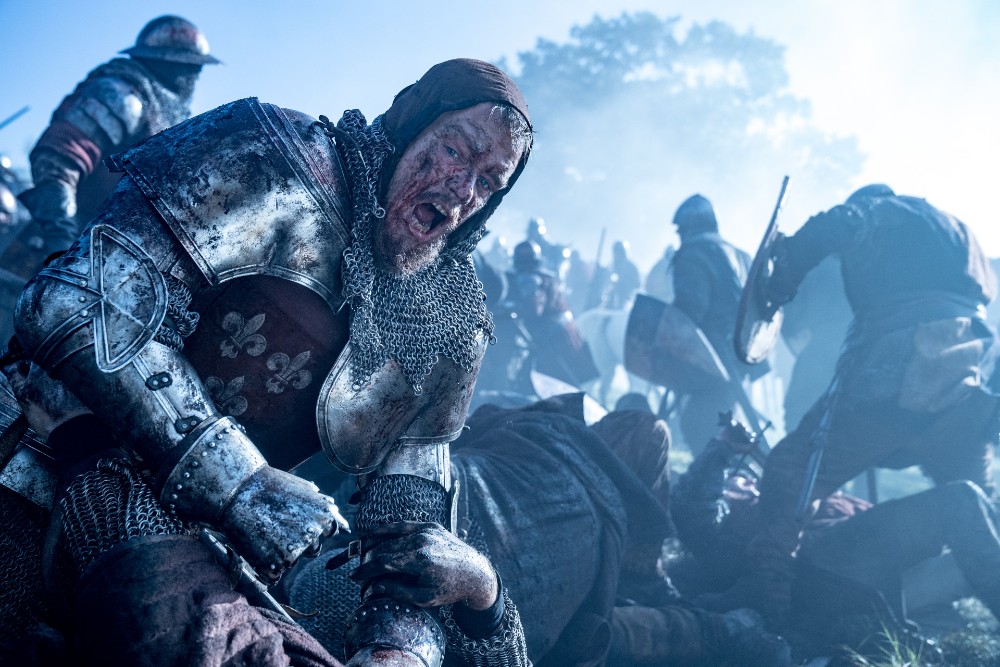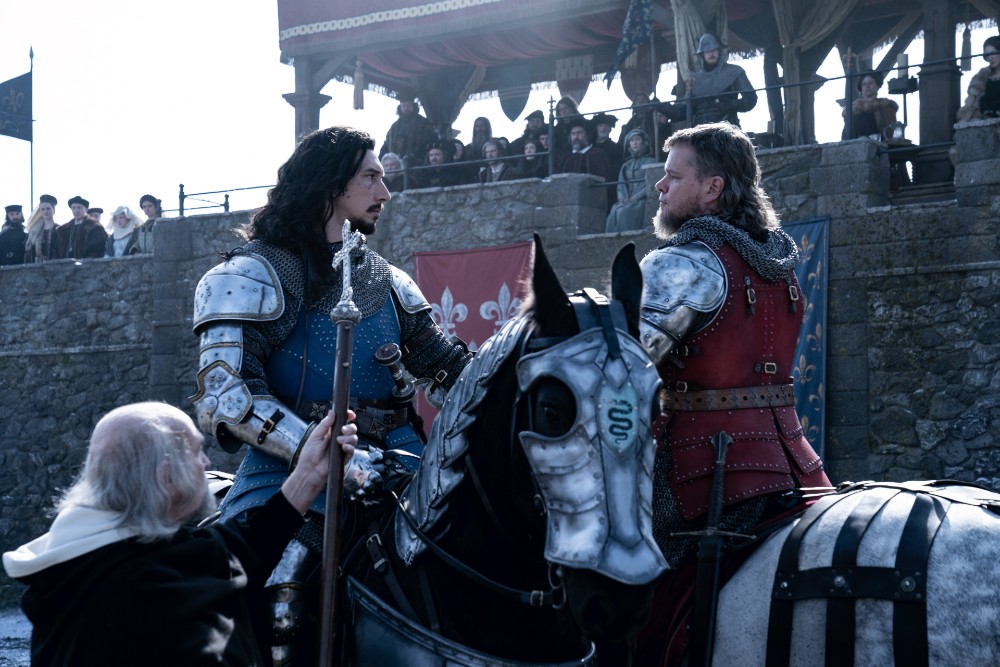
Continuing this ongoing series with a composer, who absolutely shockingly, has never been nominated for an Oscar. Harry Gregson-Williams has been nominated for an Emmy and many other awards, but he’s been doing such incredible work scoring for films, first with the late Tony Scott, and then his brother Ridley Scott, as well as for so many other projects in film and television.
2005’s Kingdom of Heaven was Gregson-Williams’ first score for Ridley, after scoring many of Tony’s films, including Enemy of the State and Man on Fire. The composer would go on to score The Martian and compose the scores for many other films, including last year’s Mulan, Michael Mann’s Blackhat, and the Denzel Washington The Equalizer and its sequel.
This year, Scott and Gregson-Williams have two very different films on which they’ve collaborated. The Last Duel stars Matt Damon, Ben Affleck, Adam Driver, and Jodie Comer, and it’s a Rashomon-like medieval tale about the relationship between three French nobles in 14th Century France whose lives are disrupted when Comer’s Marguerite, the wife of Damon’s Sir Jean De Carrouges, is raped by Driver’s Jacques Le Gris. During those times, women were not necessarily believed when accusations are made and the only way to decide whether her claims are true or not is for Carrouges and Le Gris to face each other in mortal combat.
Not quite as bloody but equally dramatic, House of Gucci is a biopic about the notorious fashion empire known as “Gucci,” starring Lady Gaga, Driver (again), Al Pacino, Jeremy Irons, and Salma Hayek. That didn’t necessarily require nearly as much scoring from Gregson-Williams, since Scott used a lot of disco and pop music from the years in which the film takes place.
Below the Line spoke with Mr. Gregson-Williams over Zoom a few weeks back about both movies, and we’ll do things a bit differently, since our conversation wasn’t quite as conducive to the normal QnA format as usual. (Note: If you have not yet seen The Last Duel, there may be a few spoilers about the film.)
Early Days with Ridley Scott
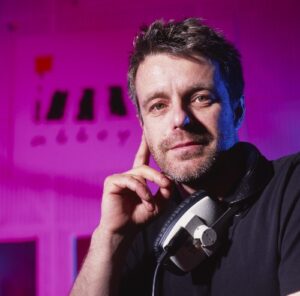
“I knew Tony far better, and I’d done Tony’s films since 1996, from Enemy of the State and Man on Fire. One day, I got a call from a friend, who actually back in the day had been Hans [Zimmer’s] tech [at Media Ventures]. His name’s Marc Streitenfeld. I got a call from Mark one night, and he said, ‘Look, Harry, I’m in London with Ridley. I’m the music editor on this movie, Kingdom of Heaven. For whatever reason, Hans isn’t doing Kingdom of Heaven, so [Ridley’s] in his editing room listening to CDs. They keep going back to listening to your work, and I would expect a call if I were you.’”
“It was a wonderful opportunity, but it was a little awkward for me at the time, because I had moved away from Hans’ studio and plugged everything in a new place and built my own studio. Everything was set and settled in my studio. All my synths were exactly where I wanted them and my samplers and the wiring had been done in a new studio I had made in Venice. On the call, Ridley said, ‘Look, it would be great if you could do this, but when can you come? You’re going to have to pack your studio and come over to London. I’m doing post-production here.’ So everything got unplugged again and off I went to London for six months.”
“Of course, [today], the technology makes it possible to have something in just a flight case and pretty much have your tools at your fingertips. Back then, there was more hardware than software, so that was a bit of a nightmare. At the end of that story, I got back to L.A. six months later, and it all had to be wired back into my studio and got going on all the movies I was doing, probably went straight onto a Tony movie. About two years later, Andrew Adamson called me, saying, ‘We’re doing another Narnia, they’ve greenlit Prince Caspian. You gotta pack up and come to London.’ By then, things had moved on a bit technically, and it wasn’t a case of literally moving everything, because so much could be in the box, as it were.”
First Learning About The Last Duel
After that, Ridley Scott called upon Gregson-Williams a number of times to help with musical themes for Exodus: Gods and Kings in between official full scoring gigs.
“He called me and said, ‘I’m sitting at home in LA. I was shooting a movie, and it got disbanded. It’s The Last Duel. I’ve kind of got half a movie here. We’ve edited it together, it looks beautiful, but unfortunately, every so often, a card comes on the screen saying ‘Carougge rides off to Scotland’ We haven’t managed to do all that. We’re going to have to go back as soon as we’re allowed to. In the meantime, one of the scenes I haven’t shot is the very, very, very final scene. In the script, it suggests that we might have the lead actress sing sotto voce, under her voice, whisper, hum, something like that to her child, who is playing in the meadow beside her. I haven’t shot that scene. It’ll be when I go back. Can you tell me what she might sing?’”
Gregson-Williams wasn’t sure if that was all Sir Ridley wanted this time, but the filmmaker confirmed that the composer would indeed be scoring the entire film when it was finished.
“The starting point for me was subtle – he sent me the script because he kept referring to the last page of the script, and I did remind him that I didn’t have a copy of the script. On the last page of the script, it said ‘Marguerite, maybe hums or sings some sort of nursery rhyme or folk song,’ and he said, ‘Look, I’m not sure whether I want the movie to finish like that. She’ll definitely be sitting in a bed with her child. I’m not sure what that if I were to need her to sing something or read something.”
“I found a text from the 1380s for that time and altered it a bit because it was nearly perfect. And we came up with a song that she might sing, but it was a long version of that. It was much more than he needed, but he really loved it. It was in French. He decided not to have her sing at the end but instead of that, we had the song that had been written for that spot, so that was a great starting point to take her melody and double back to the beginning of the film and develop that as a starting point for Marguerite.”
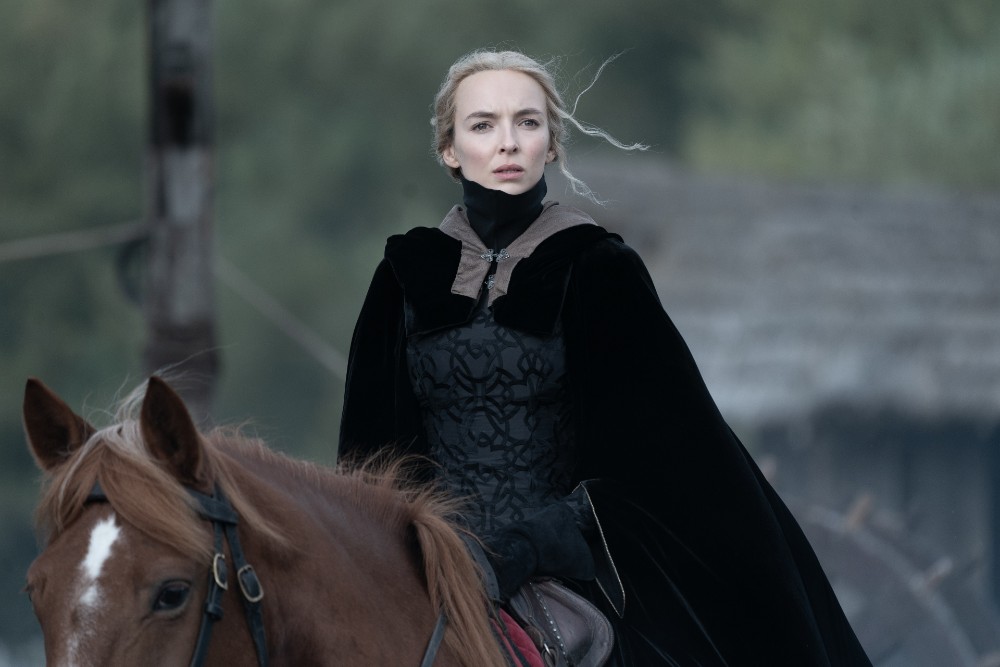
Getting Started
“When he finished shooting the film, there was a long period of post-production where I was given a copy of the film, but we all knew that wasn’t the final version of the film. It was twice as long as it was going to be, and I joined the process in a traditional spot for a composer, as they were chiseling away in the edit room trying to find the movie, either shuffling scenes, reducing the length of scenes, experimenting with where especially with this story the way that it’s told and three different points of view. There were quite a lot of choices they must have been making as they edited the film. For instance, the very first scene in The Last Duel, which is the preparation of the duel, and we see three main protagonists. We don’t know too much about them, other than these knights are getting dressed and getting ready to fight each other; she’s getting dressed, she’s being shackled, and the music takes us all the way through a build to the moment they come together. When I first started working on that scene, it was probably eight minutes long; [now] it’s probably three and a half minutes. That’s very typical of how we have to go about things. That’s the life of a film composer; we’re often playing catch up with the edit. In a perfect world, one would be handed a final cut, but the intention is for us all to be working together to find the right tone, the right voice, the right format and length of a movie. I think music’s really, really helpful with that.”
Figuring Out Marguerite’s Theme
“I had Marguerite’s Theme sorted out during that gap when he was home during COVID. Before he went back to shoot the rest of the movie, not only was I working on finding a singer but the right singer for that. I found a soprano, Grace Davidson, in England, whose voice Ridley really liked. I sorted some CDs of hers or some tracks of her singing early music, just to see if she could sing it in a way that was believable and appropriate for the medieval nature of this film. We didn’t want anybody too warbly, not too operatic and not too much vibrato, but very accurate and pure voice. She’s one of Britain’s best at the moment.
“She was really helpful as well, because once we had the song. It’s very difficult to demo a song, especially [with] a wordless voice, which doesn’t really give you what you want. For the demo, that was really kind of critical to find the voice that was going to sing the tune, not just finding the melody. That was done during COVID, and Grace was obviously done remotely to the music, and she found a way of recording herself. And when the movie was a whole movie, once Ridley had come back and post-production had started in earnest, I was able to start finding thematic material for the other two protagonists.”
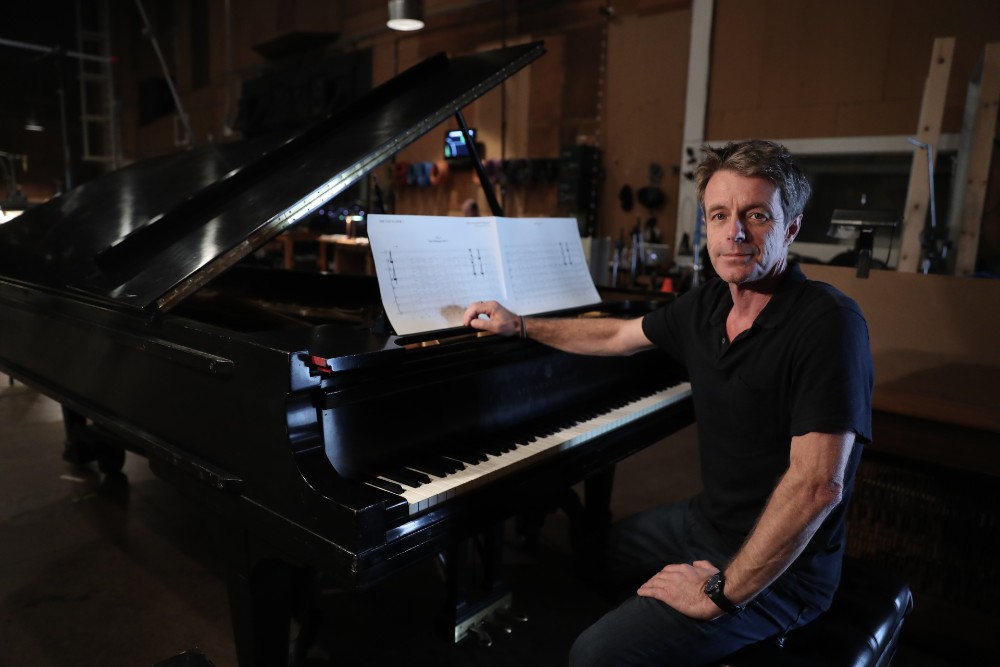
Creating Themes for the Guys
“With Jacques Le Gris, he’s a really complex character, and not unlikeable in some ways. He’s got some charm, but he’s also living in, I supposed, a typical man’s world that it was at that time. Some of the things he says after he’s assaulted this girl are shocking in the lack of understanding of what’s just happened, but apparently not unusual for the time. It seemed that he needed something to underscore him that was kind of haunting, a little unstable. I found this countertenor. For those who don’t know, the countertenor is always a male voice, but he sings at the pitch of a soprano, a girl. It’s not a falsetto. It’s a certain technique, I think a very complicated technique. Iestyn Davies is a great proponent of this, and I used him on Kingdom of Heaven, very briefly. Ridley really liked his voice, but we couldn’t find too many places to use him on Kingdom of Heaven. In this movie, I use him quite a lot in this movie over Jacques Le Gris.
“There’s something about the very unique quality that Yestin has. I had some music that I sent him, and he recorded, but I had him record these rather uncomfortable, very slow swoops, where he’d start on a lower note and get to a higher note — any note of his choice — and just rather slowly go between the two, a bit like I suppose a synth. You could use a pitch bend. He did this in different ways at different pitches, and I then put that into my sequencer and found I could layer him into this kind of creepy, haunting sound, which I pegged to Jacques Le Gris.”
“With Carrogues, Matt Damon’s character. It’s great scoring a film that Matt Damon’s in, having done The Martian, I really appreciate… he’s such a solid actor. It wasn’t difficult for me to find a melody that brought something to his character. His character was very arrogant and kind of blind to what was really going on.”
Scoring the Actual Duel
“In the first batch, infuriatingly, he had shot the beginning of the film, which, as you will know, is the preparation, and the knights coming together. And then the movie actually starts, goes to black, but the actual duel at the end, he hadn’t shot, I had to wait to see that. I didn’t start scoring the film until he was back from Ireland — they shot the rest of the film there. One of the decisions Ridley made pretty early on was that he didn’t want this film – as opposed to many of his others and certainly his brother’s – to have underscoring the battlements. He’d rather have me tee them up, lead us to that place, then leave it alone, and then come in after the event is done. It was a rather nice thing for me to do, because I’d been very used to pounding away. For instance, in Kingdom of Heaven, music did cover all the battle scenes, and it was quite a tangle to find a place for the music to be with all the sounds of the horses and the fighting going on. It was actually a refreshing approach, and that was his decision. It was actually lovely for the score, to know that I would build to a certain point, for instance, the actual duel during the movie, when we tee it up at the very beginning, the music leads us to the point that the guys come together. And then similarly, the final act of the film, I lead to a place and then the music comes in when Carrouges has his man where he wants him, and then takes us away to the end of the movie when Marguerite is sitting in a meadow, and it’s very colorful. Ridley intentionally brings in a lot of the colors, which had been quite saturated up to that point, or muted. He brings them to the foreground, and the music really blossoms.”
Instrumentation for The Last Duel
“After finding melodies for these three protagonists, it was really a case of experimenting with instruments that could be perceived as medieval. There are no prizes in this work we do as composers for 100% authenticity. Why would there be? What we’re trying to do is to have [the music] tell the story. Trying to find a pallet of sounds for this medieval movie, I might have been stuck with a couple of wooden flutes and a horn taken from a goat if I had tried to stick with authenticity. But I deployed a consort of viols, as I had done with Kingdom of Heaven actually, which is kind of quite cunning, because these instruments do sound different to a regular orchestra. They’re much more nasal, they’re not as warm, they’re not played with a vibrato. There’s something rather thin and nebulous about them, and it really puts me in mind of something that could be medieval, but actually, they were developed a bit later.”
“Obviously, I used a symphony orchestra and a choir as well, but on this occasion, not a big choir. On Kingdom, I used a huge ocean liner of a choir. I liked the intonation of it, because there’s so many of them when I recorded them for Kingdom. Conducting them, you’d have to give them five minutes notice to speed up, not for any other reason than it’s such a mass of humanity. I went the reverse way on this. I found this choir called Voces8, who are literally just eight people, and I wrote music in eight parts, so it was one to a part, whereas back on Kingdom, [it was] probably 30 or 40 people to a part. That gives you a very very intimate, a very, very different sound. And they agreed to record all the vocals that weren’t solos, so the choral stuff. They were amazing, because they have their own church where they [record] with their own microphones. Again, it was tricky because of the COVID situation – Abbey Road was closed still – so they were able to find a way to record what I needed from them. What else did I deploy? Some lovely ethnic wooden flutes — probably some of them come from the Far East and don’t belong anywhere in France. But again, it’s the sonic quality that I was after and the ability to be able to hold a top-line etude and see how that went. Some dulcimers are in there. All together, it’s a hybrid with very little synth in there, which is unusual for me. I usually find a place for something that’s generated through electricity, but not on this occasion.”
Using Church Organ
“I didn’t feel limited sonically when putting this score together, but various choices, like for instance, the church organ, which if it was around 1380 — and I’m not entirely sure that it was — it certainly didn’t have the power of the organ that I used. So again, it was really making choices that could be believable, that wouldn’t take you out of the movie but leant color to what I was trying to do. That was great fun, but let’s face it, the church had a lot to do with the story in The Last Duel. I mean, not so much as in Kingdom of Heaven. There’s some score that I wrote, which could be perceived as liturgical music, and some, the reverse. It would be unusual to find church organ in some of this music, so that seemed like a natural choice to me, just in a couple of spots.”
Three Times the Story
“The telling of the story three times, it didn’t really affect the music. I was able to focus in more on the character that we were concentrating on, during that chapter for sure, but that’s because the movie was focusing in more. I think that was something discussed beforehand. As I say, musically, I was able to focus in more — you hear more of Carrouge’s theme during Carrouge’s story simply because he’s on screen and we’re focusing on him more.”
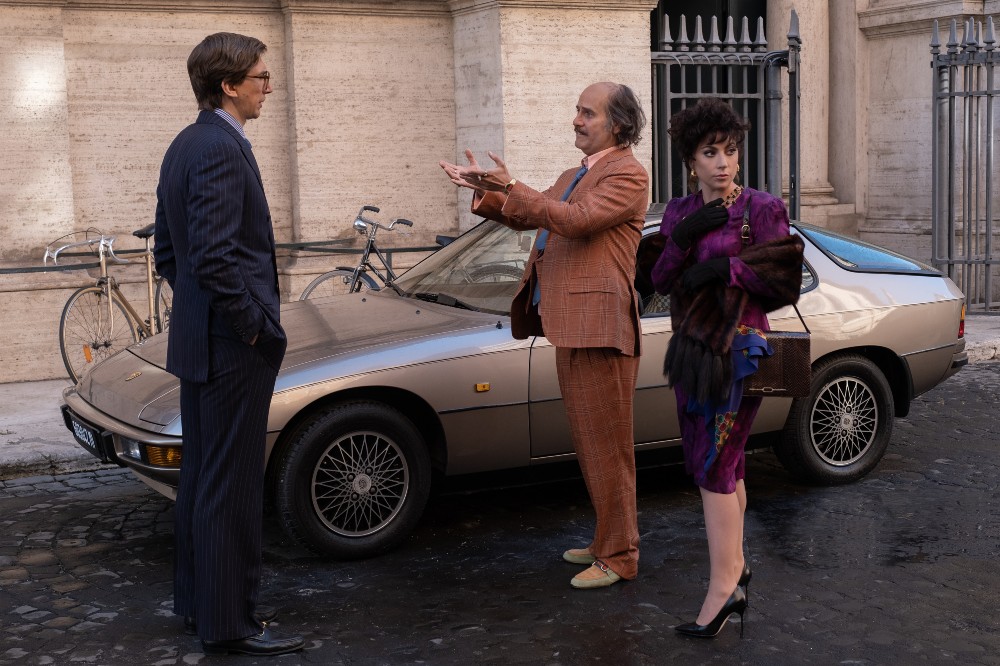
Moving Onto Gucci
Although Scott was at some point this year working on both movies, that wasn’t the case with Gregson-Williams, who finished one before moving onto the other.
“For me, there was no crossover at all. House of Gucci was a very different assignment. It’s a very fun movie and very dependent on a lot of songs and needle drops. It’s not like any of the movies I’ve done for Ridley, which are quite dependent on score. There’s no CD player playing in The Last Duel.”
“Ridley’s used music very much to center you in what period of time, because Gucci takes us through several years which span over a decade… or two. He’s used music to help center the audience with that, whether it’s a Blondie song or a David Bowie song. But the score didn’t have that job at all. My job was purely emotional and not concerned with timeframe, as it were, because the songs were doing that. You’ll hear a song and go, “Ah, that’s from 1984.” There isn’t as much score, which is very unusual for a Ridley Scott movie – in fact, for a Scott movie. I think back on all the movies I did with Tony, there was often upwards of 80 minutes of music. In The Martian or Kingdom of Heaven, probably a hundred minutes of music. Those Scott Brothers, they know what they want from the music and they deploy it accordingly. As I say, in Gucci, because there are plenty of needle drops, the score had to duck in and out of that, and it has a different job.”
“It’s got a very different feel for a Ridley Scott movie. It’s very shiny. If you compare it to The Last Duel or Kingdom, it’s beautiful to look at, but that’s [Cinematographer] Dariusz [Wolski], for God’s sake. He’s amazing, and the same editor, Claire Simpson, so it was pretty much the same team — same costume — which is great actually, it’s really wonderful, and I think most of us did The Martian together, as well.”
“I’d say that Gucci is closer to a Tarantino or a Scorsese movie or a David O. Russell movie, then you’d think it would be to a Ridley Scott movie. I think that’s what the audience will have fun with a lot. I’m so glad we did it in that order: The Last Duel and then Gucci.”
House of Gucci is still playing in theaters nationwide, while The Last Duel is now available on DVD and Blu-ray. You can hear the score for The Last Duel on Spotify. We’ll also have an interview with Cinematographer Darius Wolski to share soon.
All photos courtesy of the respective copyright holders, as noted.

